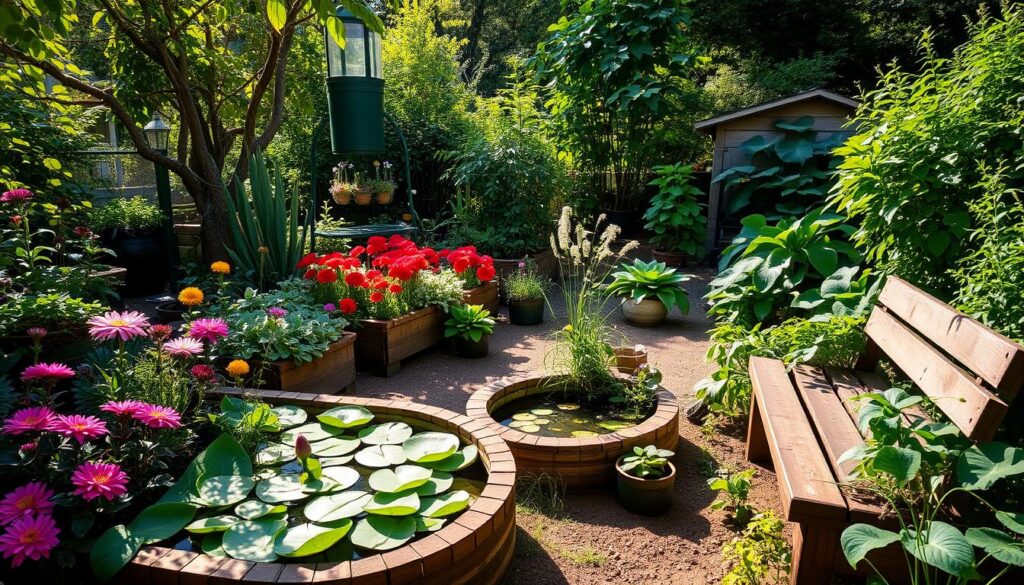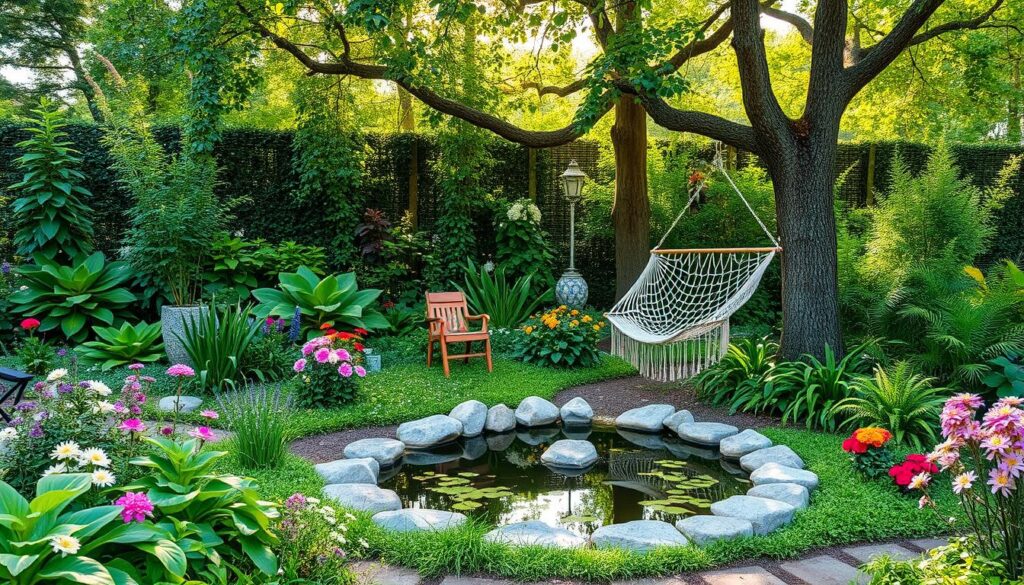When the world feels too much, nature offers a gentle healing. My journey into permaculture wellness started during a tough time of burnout. I felt disconnected from traditional mental health methods. But, sustainable living showed me a key truth: our surroundings deeply affect our inner world.
Permaculture, once just ‘permanent agriculture,’ now is a way of life that connects us with nature’s cycles. Studies show a strong link between being in nature and feeling better mentally. Being around green spaces can really cut down stress and boost our mental strength.
This guide dives into how our well-being is linked to the environment. It shows how green practices can care for our mental and emotional health, just as they do for our physical world.
Key Takeaways
- Permaculture goes beyond farming, becoming a full wellness philosophy
- Nature is key in healing our minds
- Green design can greatly improve our mental health
- Connecting with nature is a strong alternative to traditional mental health methods
- Our health is closely tied to the health of our environment
Understanding Permaculture and Its Principles
Permaculture is a new way to design living systems that work with nature. It’s all about living in harmony with the environment. This approach helps us create spaces that are good for both us and the planet.
In the 1970s, Australia saw the birth of permaculture. Bill Mollison and David Holmgren started it as a way to change farming. They wanted to go beyond just growing food, aiming for a deeper connection with nature.
Definition of Permaculture
Permaculture is a way to design systems that work like nature. It makes farming and communities sustainable and self-sufficient. It’s about living in balance with the environment.
Core Principles of Permaculture
- Care for the Earth: Protecting and regenerating natural environments
- Care for People: Supporting human community well-being
- Fair Share: Redistributing surplus resources equitably
“Permaculture is a revolution disguised as gardening” – Bill Mollison
Benefits of Permaculture Practices
People who practice permaculture gain a lot. They see:
- Healthier lives and environments
- Less waste and better use of resources
- More biodiversity and resilient ecosystems
- Improved mental and physical health
By following permaculture, we can connect more with nature. We make choices that are good for us and the planet. It’s a way to live in a way that’s sustainable and regenerative.
The Connection Between Nature and Mental Health
Green living solutions are more than just ways to protect the environment. They also help our mental health. Nature has a deep healing power that can change how we feel, making our minds and the planet healthier together.

Studies show that nature greatly affects our mental health. Being in nature is not just nice to look at. It’s essential for our well-being, helping us feel better.
Research on Nature’s Impact on Well-Being
Many studies have found nature’s healing power:
- Reduced stress levels by up to 20%
- Improved mood and thinking
- Helped with emotional control
- Lessened anxiety and depression
Nature Therapy and Its Benefits
Nature therapy uses nature to heal us. Green spaces act as natural medicine, helping our minds without drugs.
| Therapy Type | Mental Health Benefits |
|---|---|
| Forest Bathing | Reduces cortisol, improves immune function |
| Gardening Therapy | Decreases depression, increases self-esteem |
| Wilderness Experiences | Enhances emotional resilience |
Ecotherapy: Healing Through Nature
“In every walk with nature, one receives far more than he seeks.” – John Muir
Ecotherapy is a complete way to heal our minds, using nature in therapy. By making spaces that connect us with nature, we help our minds heal.
Choosing green living helps us change our mental health. It builds strength by connecting with nature on purpose.
How Permaculture Can Enhance Mental Well-Being
Permaculture is more than just gardening. It’s a way to create spaces that heal both body and mind. These spaces are designed to support our overall health.
Being in nature through permaculture has big benefits for our minds. Studies show that being around green spaces can make us feel better. It lowers stress and helps us feel more balanced.
Creating Green Spaces for Mental Wellness
Green spaces made with permaculture can change how we feel. They offer many benefits, including:
- Reducing stress levels by 40%
- Improving sleep quality
- Enhancing motor skills and coordination
- Increasing vitamin D exposure
“Nature is not a place to visit. It is home.” – Gary Snyder
Permaculture as a Form of Mindfulness
Permaculture encourages mindfulness. Observation and intentional design make it a meditative practice. It helps us stay present and connected to nature.
Building Community Through Permaculture
Permaculture is not just for individuals. It also brings people together. Community gardens and shared spaces help us feel less lonely. They promote well-being for everyone.
By using permaculture, we can make spaces that support our mental health. These spaces help build strong communities and deepen our connection with nature.
Gardening for Mental Health
Permaculture wellness design is a powerful way to improve holistic health through garden therapy. Gardening changes more than just outdoor spaces. It’s a deep journey of healing for the mind and emotions.

Research shows gardening is linked to better mental health. Permaculture practices help our mental health by connecting us with nature.
Therapeutic Benefits of Gardening
Gardening has amazing mental health benefits:
- Reduces stress by up to 30%
- Increases serotonin through soil bacteria
- Triggers dopamine during harvest
- Improves mood and emotional balance
Designing Your Permaculture Garden
Creating a holistic health garden needs careful planning. Think about these design elements:
- Include calming green spaces
- Use biodiverse planting
- Add sensory elements like water features
- Create areas for reflection
“Gardens are not created or made, they are something magical that happens when intention meets nature.”
Seasonal Activities in the Garden
Stay connected with your garden all year for better mental health. Each season brings new chances for growth, healing, and connection through permaculture wellness design.
The Role of Biodiversity in Mental Wellness
Biodiversity is key to a regenerative lifestyle that boosts eco-friendly wellness. Our natural worlds are complex, offering deep mental health benefits through their connections.
Exploring the link between biodiversity and mental health reveals interesting facts. Studies show that diverse ecosystems greatly affect our mental well-being.
Importance of Biodiversity in Permaculture
Permaculture design values biodiversity deeply. It creates rich, varied spaces that help us:
- Attract helpful insects and animals
- Balance nature’s interactions
- Make landscapes visually appealing
- Lessen stress with nature’s complexity
How Biodiversity Enhances Mental Health
Diverse ecosystems bring unique mental health perks. Scientific studies show that being around different natural settings can:
- Lower anxiety and depression
- Boost brain function
- Make us emotionally stronger
“In nature’s diversity, we find our own inner balance and healing.” – Ecological Wellness Research
Creating Habitats for Wildlife
Adding wildlife habitats to your permaculture design helps both the environment and your mental health. Sustainable actions can turn areas into lively ecosystems that support mental health.
By embracing biodiversity, we make spaces that support local wildlife and offer deep mental benefits. The web of life reminds us of our bond with nature.
Sustainability Practices to Boost Mental Health
Sustainable living is a powerful way to improve mental health. Green living solutions do more than help the environment. They also support our overall well-being. Permaculture shows how our mental health is linked to nature.

Starting sustainable practices can change our surroundings and minds. Studies show that being in nature lowers stress and boosts our mental strength.
Sustainable Living and Psychological Benefits
Living sustainably improves our mental clarity. It offers many psychological benefits, including:
- Less stress from being in nature
- A sense of doing something good
- Feeling closer to nature
Composting for Mental Clarity
Composting is a key sustainable practice that helps our mental health. It’s a calming activity that makes us feel better.
“In composting, we witness transformation—a metaphor for personal growth and renewal.”
Water Management Techniques
Using smart water-saving methods is good for both the planet and our minds. Techniques like rainwater harvesting and efficient irrigation help us feel connected to nature.
| Sustainability Practice | Mental Health Impact |
|---|---|
| Composting | Reduces anxiety, increases mindfulness |
| Rainwater Harvesting | Promotes sense of environmental responsibility |
| Organic Gardening | Decreases stress, improves mood |
By integrating sustainable living practices, individuals can create meaningful connections between personal wellness and ecological health.
Building Connections Through Permaculture
Permaculture is a powerful way to build strong community bonds. It uses earth-friendly wellness design and sustainable practices. These help change local areas and make social ties stronger.
Permaculture is more than just gardening. It’s a way to create strong, supportive networks. These networks focus on both the environment and people’s well-being.
Engaging with Local Communities
Permaculture projects succeed when people work together. The School of Permaculture, led by Nicholas Burtner, has shown great success in many places:
- Farms and suburban homesteads
- Public parks
- Apartment complexes
- College campuses
Workshops and Educational Opportunities
Learning is key in permaculture. It helps people grow their skills bit by bit through education.
“No one can achieve self-sufficiency alone; collaboration is essential.” – Permaculture Design Principle
Volunteer Programs and Their Impact
| Program Type | Community Benefits | Learning Outcomes |
|---|---|---|
| Community Gardens | Food Security | Sustainable Agriculture Skills |
| Urban Restoration Projects | Environmental Rehabilitation | Ecological Design Principles |
| Educational Workshops | Knowledge Sharing | Permaculture Design Techniques |
By learning one new permaculture skill at a time, people can slowly adopt sustainable systems. The goal is to create designs that are easy to maintain. These designs should keep giving back to the community for a long time.
Designing a Permaculture Space for Relaxation
To create a space for mental wellness, you need to plan carefully. Use permaculture design principles. These spaces are like sanctuaries for healing and personal growth.

Creating peaceful spaces is more than just making them look good. It’s about how nature can calm our minds and balance our emotions.
Elements of a Relaxation Space
- Soft, curved pathways that mimic natural landscape contours
- Water features that create soothing acoustic environments
- Comfortable seating areas with natural materials
- Strategic wind and sun protection
Plants That Promote Calmness
Choosing the right plants is key for mental wellness. Some plants that help include:
- Lavender – known for stress reduction
- Chamomile – promotes relaxation
- Rosemary – enhances mental clarity
- Jasmine – improves mood and sleep quality
Incorporating Art and Nature
Adding art to nature creates a complete relaxation experience. Sculptural elements, natural stone, and visual points can turn a garden into a healing space.
“In nature-inspired design, every element tells a story of healing and connection.”
By designing spaces that engage our senses, we can make powerful places. These places support mental wellness and personal growth.
Integrating Mindfulness into Permaculture
Permaculture is a way to live in harmony with nature. It combines nature-based practices with mindful awareness. This approach helps us grow mentally and spiritually.
Mindfulness makes gardening more than just a task. It turns it into a healing experience. By connecting with nature, we gain mental and emotional benefits.
Mindfulness Practices While Gardening
- Practice deep breathing while planting seeds
- Focus on sensory experiences of soil texture
- Observe plant growth with intentional awareness
- Use gardening as a moving meditation
Reflective Journaling in Nature
Journaling outdoors can clear your mind. Writing in nature helps us reflect and understand ourselves better.
“In every walk with nature, one receives far more than he seeks.” – John Muir
Meditation Techniques in Outdoor Spaces
Creating meditation areas in permaculture landscapes is healing. These spaces bring peace and support mental health through design.
- Create quiet corners with comfortable seating
- Incorporate calming plants like lavender
- Use natural sound elements like water features
- Develop spaces that encourage peaceful contemplation
Mindfulness in permaculture helps us connect with ourselves and nature. It promotes well-being and personal growth.
Challenges in Implementing Permaculture
Starting sustainable living practices can be tough. Many face barriers that stop them from adopting eco-friendly wellness. Permaculture, in particular, has big hurdles that can discourage even the most dedicated.
Common Obstacles to Starting a Garden
Starting a sustainable garden is full of challenges. Key barriers include:
- Limited space in urban environments
- Lack of initial knowledge about gardening techniques
- Financial constraints for purchasing materials
- Time management challenges
“The greatest barrier to sustainable living is often our own perception of limitation.” – Permaculture Design Expert
Overcoming Mental Blocks in Nature Engagement
Many struggle with mental barriers to nature. Eco-friendly wellness means breaking through doubt and fear. Ways to overcome include:
- Start with small, manageable garden projects
- Join local gardening communities
- Attend workshops and educational seminars
- Practice mindful observation of natural spaces
Finding Support Networks
Building strong community ties is key to permaculture success. Local groups, online forums, and sustainability networks offer vital support and advice.
Statistics show the need for sustainable practices: 18% of U.S. CO2 output comes from agriculture. Permaculture is a better way, promoting ecosystem health and reducing harm.
By tackling these challenges, we can change our approach to sustainable living. We can make real connections with nature.
Case Studies: Successful Permaculture Projects
Permaculture design principles have changed healthcare and wellness around the world. These new ways show how sustainable wellness and healing environments work together.
Local Initiatives That Promote Mental Health
Local projects have shown how permaculture can change healthcare. Some key examples include:
- Urban medical centers with therapeutic gardens
- Community wellness programs based on nature
- Rehabilitation centers using permaculture design
“Nature itself is the best physician” – Hippocrates
Global Examples of Permaculture Success
Healthcare facilities worldwide have adopted sustainable wellness with permaculture. Studies show better patient results and happier staff.
| Region | Project Impact | Key Outcomes |
|---|---|---|
| United States | Healing Garden Programs | 50% reduction in patient stress levels |
| Australia | Community Care Gardens | 30% increase in patient engagement |
| Netherlands | Therapeutic Landscape Design | 40% improvement in mental wellness metrics |
Personal Stories of Transformation
Personal stories show the big impact of permaculture. People talk about how nature helps them heal. Patients and doctors find new meaning in their work through nature.
Permaculture is changing healthcare everywhere, from cities to countryside. These stories prove that sustainable wellness is real and can change lives.
Resources for Further Exploration
Exploring permaculture wellness design means finding great resources for personal growth and green living. This journey involves learning from nature and mental health practices. It’s about finding the right materials that connect these two areas.
Many books and online platforms offer insights into permaculture. Experts suggest “Permaculture: A Designers’ Manual” by Bill Mollison and “The Resilient Farm and Homestead” by Ben Falk. These books help understand sustainable living and how it supports mental health.
Books and Guides on Permaculture
Online communities are great for connecting with others interested in permaculture wellness design. Sites like Permaculture.org and forums like Permies.com are interactive. They let people share experiences and support for holistic mental health.
Online Communities and Forums
Getting professional help is key in green living solutions. Ecotherapy is a growing field with therapists who use nature for mental health. The International Association for Ecotherapy has a directory of these professionals.
Professional Help: Therapists and Counselors in Nature-Based Wellness
People looking to use permaculture in their mental health journey have many resources. From books to community networks and professional advice, the path to wellness is growing.

